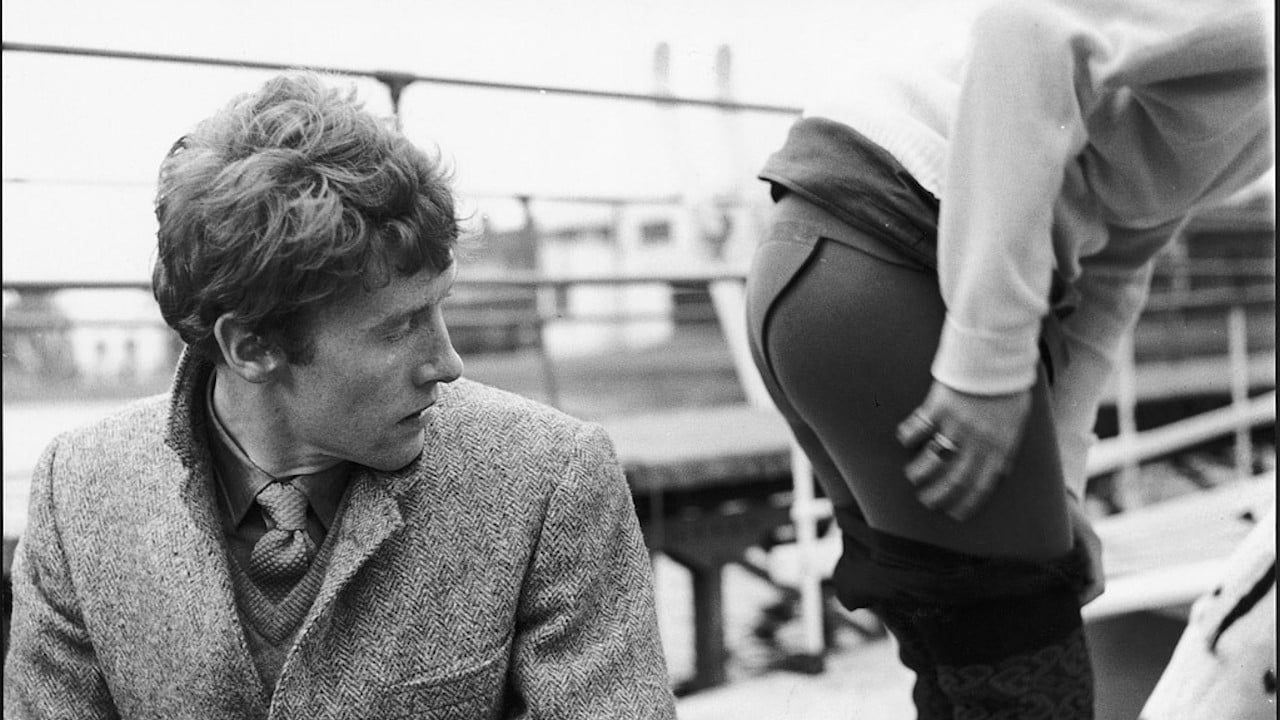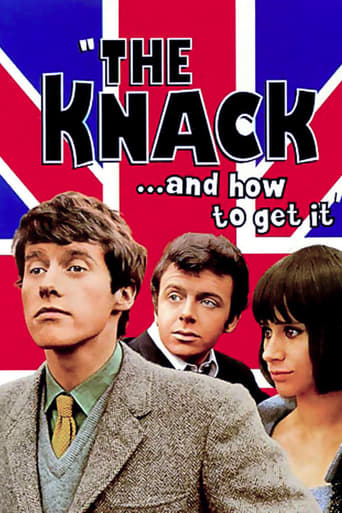

Who payed the critics
... View MorePlot so thin, it passes unnoticed.
... View Morehyped garbage
... View MoreThis movie tries so hard to be funny, yet it falls flat every time. Just another example of recycled ideas repackaged with women in an attempt to appeal to a certain audience.
... View MoreThis film won the Palme d'Or at Cannes, but no surprise...it's the kind of "transgressional" film that critics love, those films that break taboos and mock tradition. (That mockery is very clear in "The Knack." One of the recurring narrative devices is using commentary by "old people" on the horrible behavior of the young. Many of these comments contain "unwitting" double entendres: oh, how clever we script-writers are!) It's a flimsy plot about a man about town who can have any woman he wants (indeed, they line up outside his flat), and his downstairs neighbor, a naïve teacher who'd like to learn how to get women to like him. It's told in Lester's early style, with loads of quick cuts, odd angles, mannered dialog, etc. A new woman arrives on the scene and a sort of competition ensues for her "favors." The plot advances at a sluggish pace, bogged down by long set pieces, including a silly slapstick sequence in which three characters move a huge iron bed frame from a junkyard to the flat. Near the end, the suave ladykiller almost has his way with the girl, but she goes into a state of psychological shock in which she imagines she has been raped. This is actually played for COMEDY, and the word "rape" is used about 100 times in a painful denouement. Oh, how transgressive we film-makers are! THE KNACK is one of those films that tried so hard to be hip and contemporary that today, it's almost impossible to watch without cringing. John Barry's score adds even more "nails-on-the-blackboard" ambiance with its relentless, shrill pop sounds. I'm sure this was all very shocking at the time, which seems to have been the main idea behind this regrettable relic from the swinging 60s.
... View MoreA steady stream of very attractive and nearly identical manikins come to life and march starry-eyed around the block and up the stairs to a flat where they briefly meet the object of their desire before dutifully signing his guest book on the way out. The man they came to see is the suave Lothario who will try to mentor the socially awkward teacher living downstairs in the "knack" of seducing women. As so often happens in situations like this, they will eventually end up competing for the affections of the same intriguing ingénue.This may sound like an overused cliché likely to result in a formulaic romantic comedy, but director Richard Lester gives us something very different as he presents the story through a combination of exaggerated caricatures, fantasy sequences and zany metaphors. The result is that we are not so much interested in the details of the story as we are in the fun we have reaching the inevitable conclusion and the social commentary we encounter along the way. Created in 1965, Lester makes a hefty contribution to the creation of a frenetic visual style of comedy which will be imitated with great commercial success throughout the rest of the decade (think "Laugh-In"). With its mod styling, rapid-fire editing, non sequiturs and wacky antics, Lester effectively uses this style to provide some wickedly clever parody of early 1960s sexism, conformity and consumerism.The film is unfortunately not without some serious flaws. The comic style which may have seemed fresh and exciting at the time has not aged well. The good-natured mood of the film robs the social commentary of any punch or staying power, as does the failure to integrate it into a unifying framework. Also, the four main characters may be wonderfully portrayed with excellent comic acting, but only one of them is scripted such that he ever becomes human enough for us to care what happens to him, something which is essential in a story that is entirely about the relationships between the main characters.One may find this to be a very enjoyable and memorable film in spite of these flaws, but it clearly requires that you recognize how to accept what it attempts to offer rather than criticizing it for what it doesn't deliver. I'd also think that it's a valuable film for anyone interested in the 1960s mass media image of a mostly mythical swinging London and in the trends influencing popular entertainment during that time period.
... View MoreAlthough some people like to call "The Knack" one of the best comedies of the sixties I don't agree with them. It's just a very silly, unorganized, hectic and boring farce about four beatniks running around and talking weird nonsense all the time. Especially the ugly duckling Rita Tushingham is getting on your nerves pretty soon.If people are doing things like that in a 1960's movie and are reading quotations from Karl Marx or a Mao bible, it's probably a Jean-Luc Godard film. If you leave away Marx and Mao and add hundreds of stupid jokes in a row that are all falling flat, it's probably a Richard Lester movie. "The Knack" is very much like Lester's Beatles movies - great music throughout, this time provided by a rousing John Barry score with a great theme tune, but no script, bad acting and a big bore... in Germany we would call that "beknackt" (sic!) - simply stupid!If you are looking for entertaining British movies from and about the sixties, there are much better ones. Check out Antonioni's "Blow-up", the James Bond movies and it's parodies like "Casino Royale" or the Harry Palmer films, "The Thomas Crown Affair" or the kitchen sink dramas of the early sixties like "Saturday Night and Sunday Morning", "Wild Honey" or "Four in the Morning". Or take "Beat Girl", a rather unknown 1960's mod-flick with another great Barry score.
... View MoreThe Knack emerges as a serious contender as the film which best defines and captures the essence of the sixties. As a product of its age, it convincingly portrays an image of 'swinging London' that so dominated the media at that time. It is an enduring image, which has long since seeped into our collective consciousness.Today, The Knack appears, at best, to be an attempt at understanding the changing moral landscape that was being radically redrawn during this era. As a piece of contemporary film making, it manages to capture the spirit of that age perfectly. What it doesn't necessarily do is make sense of it all. The 1960s was, after all, a period of rapid social and political change - an age of cold war tension, supersonic invention and lunar landing pretensions, combined with increasing freedom for teenagers, both in terms of sex and spending power.The quartet of principal actors, Crawford, Tushingham, Brooks & Donnelly all give bravura performances. Richard Lester's direction was exemplary; indeed, he has probably not made a better film since those heady days. The locations, featuring some rather dingy-looking parts of the capital, look all the more so thanks to the decision to film in monochrome. This was particular brave considering the colourful times the film was depicting. The one ingredient which most of all created the sense of playfulness indicative of the film was John Barry's wonderfully mischievous jazz-tinged pop score. One cannot imagine the film without it, which is the highest compliment one can pay to a film soundtrack.There is no doubt that The Knack was and remains a stylish movie, albeit rooted in its time. No viewer can fail to date its origin correctly ... yet that's precisely what makes this celluloid time-capsule such a fascinating viewing experience. It exists as the archetypal mid-sixties art-house movie, which, like the decade in which it was written, took risks, dared to be different, and, if it didn't always succeed, sure as hell made an impression.
... View More